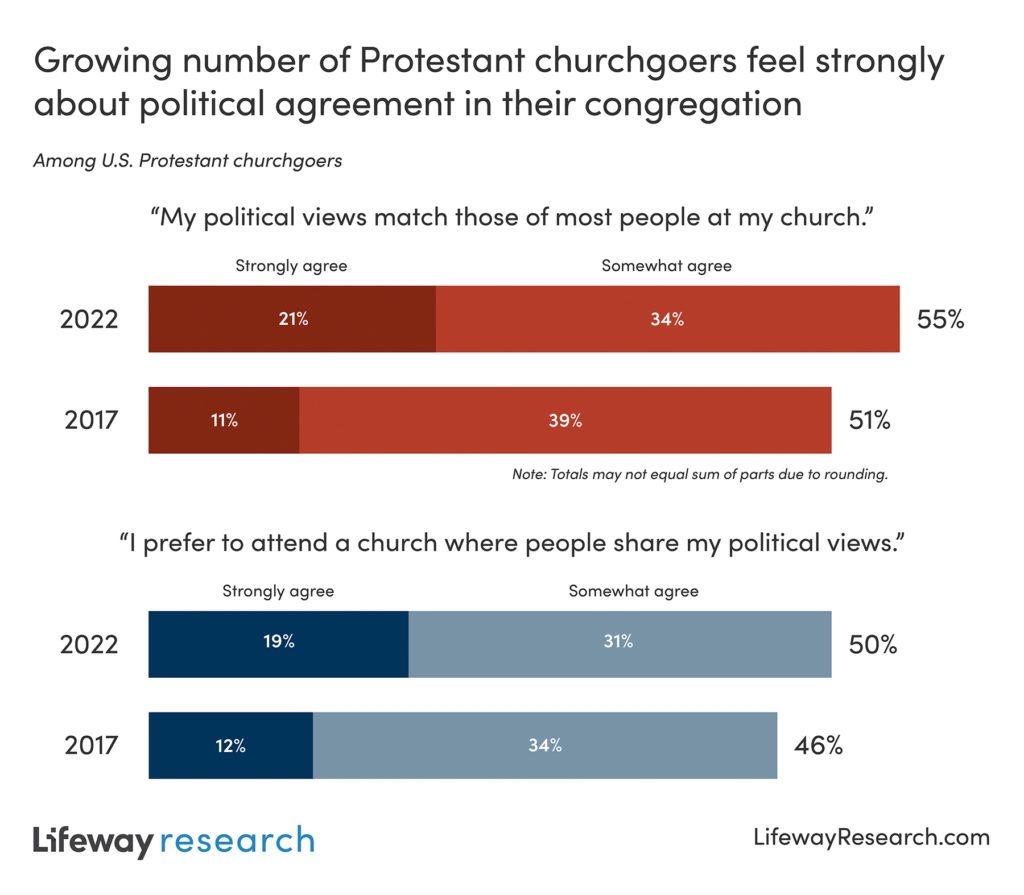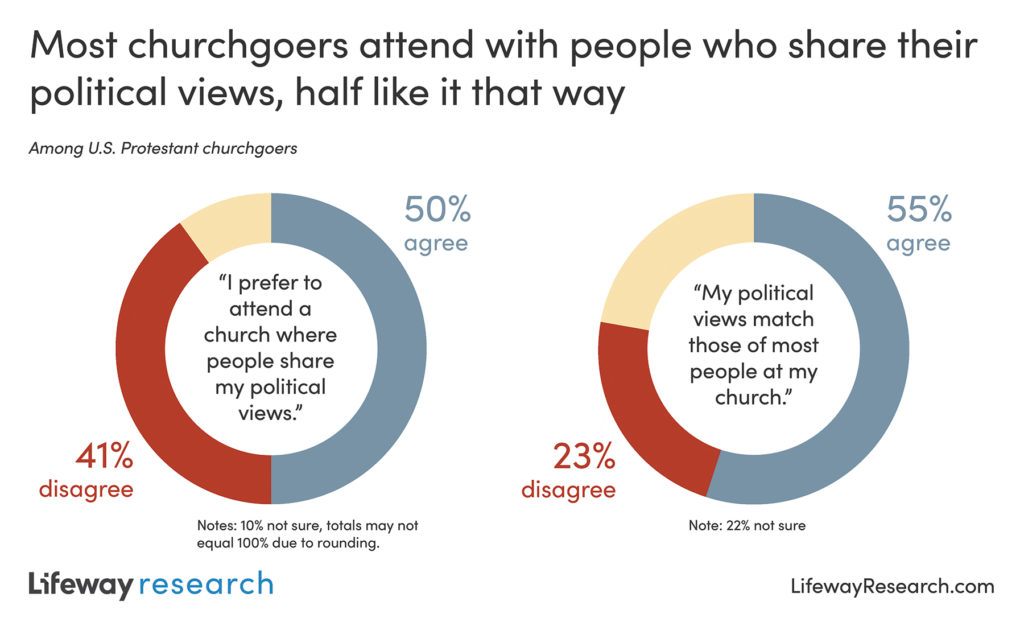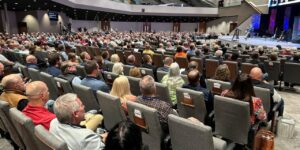
NASHVILLE (BP) – As churchgoers head to the ballot box for midterm elections, most expect the rest of their congregation to be voting the same way they do.
Half of U.S. Protestant churchgoers (50 percent) say they’d prefer to attend a church where people share their political views, and 55 percent believe that to be the case at their congregation already, according to a study from Lifeway Research.
“Studies have shown that voting patterns and political affiliation correlate with the type of church and amount of church involvement someone has,” said Scott McConnell, executive director of Lifeway Research. “But when asked if churchgoers want political similarity to flow back into their church relationships, this is desirable for only half of churchgoers.”
Political preference

While 50 percent of churchgoers prefer a politically homogenous congregation, 41 percent disagree, and 10 percent aren’t sure. Overall, the percentage of those looking to attend a church where people share their voting preferences is similar to a 2017 Lifeway Research study, when 46 percent said the same. However, more churchgoers are adamant about worshipping alongside their political peers. Around 1 in 5 (19 percent) now strongly agree they prefer to attend a church where people share their political views, up from 12 percent in 2017.
“While almost 1 in 5 churchgoers is adamant that they want to attend church with those who share their political views, there are just as many who strongly disagree with that perspective,” McConnell said. “The 23 percent who strongly disagree are clearly saying the source of unity they have with others in their church has nothing to do with partisanship.”
Younger churchgoers are more likely than older ones to prefer sharing a pew with someone of the same politics. Almost 3 in 5 of those under 50 (57 percent) want a congregation with people who share their political views, compared to 47 percent of those 50 to 65 and 41 percent of those 65 and older.
Ethnicity and education also play a role. White (54 percent) and African American (53 percent) churchgoers are more likely to want a church with shared politics than Hispanic churchgoers (25 percent). Those who are high school graduates or less (44 percent) are among the least likely.
Denominationally, Methodist (88 percent) and Restorationist movement (80 percent) churchgoers are more likely to say they want their congregations to have a common political perspective than Baptists (47 percent), Presbyterian/Reformed (47 percent), Lutherans (38 percent) and those who attend a non-denominational church (38 percent).
Churchgoers with evangelical beliefs (44 percent) are less likely than churchgoers who don’t strongly agree with the four core evangelical theology statements (54 percent) to say they prefer a church where people share their political opinions.
Despite their preferences, churchgoers may stick around even if the rest of the congregation doesn’t share their views. Another 2017 Lifeway Research study found only 9 percent of Protestant churchgoers said they would consider changing churches over political views.
Political perception
Regardless of their preferences, most churchgoers believe they’re among their political tribe when at church. More than half (55 percent) of U.S. Protestant churchgoers say their political views match those of most people at their church. Fewer than a quarter disagree (23 percent) or aren’t sure (22 percent).
Just as more churchgoers strongly prefer a congregation of similar politics today, more churchgoers also strongly believe they are a part of such a congregation. In 2017, 51 percent felt their church was politically homogenous, with 11 percent strongly agreeing. Today, 21 percent strongly agree.
Additionally, fewer churchgoers are seemingly unsure about the political opinions of their fellow congregation members. In 2017, 30 percent said they weren’t sure if their political views matched those of most others at the church. That dropped to 22 percent in 2022.
“If one looks at the culture today, you might assume that most churches have been arguing over politics as well. While it appears more churchgoers notice the political views of other attendees, only 28 percent of pastors agree (14 percent strongly) that their church has experienced significant conflict in the last year,” McConnell said. “Those who want political continuity may simply want a respite from political strife at church, and others may want to move together in political action.”
For many groups, their perception of their church matches their preferences. Older churchgoers, those 65 and older, are the least likely to think most people in their church share their politics (46 percent) and the most likely to say they aren’t sure (32 percent). African American (60 percent) and white (58 percent) churchgoers are also among the most likely to agree. Denominationally, Methodists (89 percent) and those a part of a Restorationist movement church (76 percent) believe most of the fellow churchgoers share their political views.
Churchgoers who don’t qualify as evangelical by belief are just as likely to say they prefer to worship in a church that shared their politics (54 percent) as they are to believe that is the case (53 percent). Churchgoers with evangelical beliefs, however, are different. They’re more likely to believe they belong to a congregation that predominantly agrees with them politically (59 percent) than they are to say that’s what they’d prefer (44 percent).
For more information, view the complete report and visit LifewayResearch.com.
Methodology
The online survey of 1,002 Americans was conducted Sept. 19-29, 2022, using a national pre-recruited panel. Respondents were screened to include those who identified as Protestant/non-denominational and attend religious services at least once a month. Quotas and slight weights were used to balance gender, age, region, ethnicity, education and religion to reflect the population more accurately.
The completed sample is 1,002 surveys. The sample provides 95 percent confidence that the sampling error from the panel does not exceed plus or minus 3.3 percent. This margin of error accounts for the effect of weighting. Margins of error are higher in sub-groups. Comparison was made to an online survey of 1,010 Protestant Americans conducted Aug. 22-30, 2017.
Evangelical Beliefsare defined using the National Association of Evangelicals/Lifeway Research Evangelical Beliefs Research Definition based on respondent beliefs. Respondents are asked their level of agreement with four separate statements using a four-point, forced choice scale (strongly agree, somewhat agree, somewhat disagree, strongly disagree). Those who strongly agree with all four statements are categorized as having Evangelical Beliefs:
- The Bible is the highest authority for what I believe.
- It is very important for me personally to encourage non-Christians to trust Jesus Christ as their Savior.
- Jesus Christ’s death on the cross is the only sacrifice that could remove the penalty of my sin.
- Only those who trust in Jesus Christ alone as their Savior receive God’s free gift of eternal salvation.















